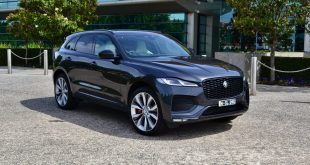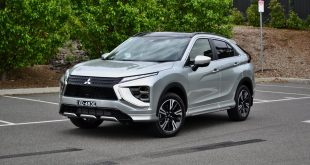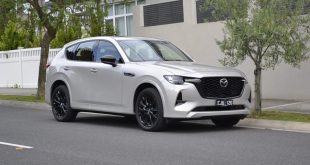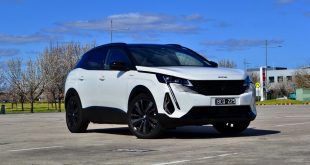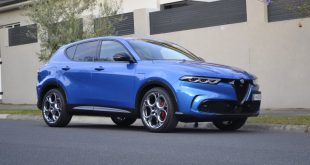You can say both Hyundai and Kia are the trailblazers when it comes to mainstream electric vehicles. It started with the Hyundai Ioniq EV sedan which has since spun the excellent Ioniq electric range.
Now the brand is applying the same formula to its luxury off-shoot’s Genesis GV70 Electric.
Like the original Hyundai Ioniq, the Genesis GV70 Electric is based on a petrol-powered platform and not the dedicated electric E-GMP architecture which underpins the current crop of electric vehicles from the Hyundai Group such as the Genesis GV60, Hyundai Ioniq 5, Kia EV6 and EV9.
Don’t let that put you off though as the GV70 is a very good product by its own right and Hyundai has simply taken some of the electric components from the E-GMP, namely the battery, electric motor and associated bits, and shoehorned them onto the GV70 platform.
So, does electrification makes the Genesis GV70 even better? Let’s find out.
How much is the Genesis GV70 Electric?
The fossil-fuel powered GV70 range starts from $70,500 and tops out at $85,100 plus on-road costs. You can read about them here.
The GV70 Electric on the other hand is offered as a single variant priced from $127,800 plus on-road costs which is a giant leap from the GV70 3.5T AWD Sport flagship.
It’s also pricier than the more established BMW iX3 ($104,900), Tesla Model Y Performance ($82,900) and Lexus RZ450e ($121,675).
2024 Genesis GV70 pricing (excluding on-road costs):
- GV70 2.5T 2WD – $70,500
- GV70 2.5T AWD – $72,900
- GV70 3.5T AWD Sport – $85,100
- GV70 Electric – $127,800
What do you get?
Unlike most of its rivals, the Genesis GV70 Electric comes with a tonne of standard equipment with nothing left on the option list.
Standard features highlight include:
- 20-inch alloy wheels
- Matrix LED headlights
- Auto wipers
- Nappa leather upholstery
- 5-inch touchscreen infotainment system
- 3-inch digital dashboard
- Satellite navigation with augmented reality
- 14-speaker, Lexicon sound system
- Wired Apple CarPlay and Android Auto
- Wireless phone charging
- Active noise cancelling
- Heat-up display
- Heat pump heater
- Heated front and rear outboard seats
- Powered and ventilated front seats with active bolsters
- Three-zone climate control
- Heated steering wheel
- 360-degree view cameras
What’s the Genesis GV70 Electric like on the inside?
There isn’t much that differentiates the GV70 Electric from ‘regular’ GV70s except for the EV specific instrument cluster.
The 14.5-inch widescreen touchscreen is brilliantly crisp and responsive, while the 12.3-inch digital instruments come with novel 3D graphics that’s sure to impress your passengers as long as they look at it straight on.
You can choose 4 different types of displays for the instrument cluster that shows varying information, or link this to the drive mode.
The touchscreen also has handy shortcut buttons that live below the air-conditioning controls.
The system can also be controlled via the rotary controller on the centre console, which can be easily confused with the gear selector dial as they are almost identical in size.
We also like the fact Genesis has chosen to use simple dial and buttons for the climate control.
Interestingly, perhaps due to its older electrical architecture, the GV70 does not come with wireless Apple CarPlay or Android Auto. Instead, you have to connect to the system via a cable.
Like its petrol-powered counterparts, it’s still a roomy five-seat mid-size SUV that feels a bit bigger than it is.
The front seats are comfortable especially on longer journeys, with active bolstering and massage function. The are two cup holders, a good-sized bin under the centre armrest and wireless charging pad up front.
You’ll find plenty of space in the back, too, with decent head and legroom. The rear back rest can also recline for extra comfort. Amenities in the second row include a centre armrest with two cup holders, rear air vents, two USB-A ports, a 12-volt as well as 240-volt power outlet.
The GV70 Electric’s boot is a fraction smaller compared to the petrol-powered variants, shrinking by 39L to 502L due to the rear electric motor. Under the bonnet, there’s an additional 22L of storage.
The charging cable lives in a compartment under the rear boot floor along with the tool kits. There is a tyre repair kit in lieu of a spare wheel.
What’s underneath the Genesis GV70 Electric’s bonnet?
The GV70 Electric packs two electric motors each generating 160kW of power and 350Nm of torque (180kW on boost). Combined they produce 320kW (360kW on boost) and 700Nm.
That’s enough to send the luxury SUV from 0-100km/h in 4.2 seconds, according to Genesis.
Like all EVs, the motors are connected to a single-speed reduction gear transmission.
How energy efficient is the Genesis GV70 Electric?
Genesis says the GV70 Electric’s 77.4kWh battery is good for 445km on a full charge and it isn’t far from our on-test maximum range of approximately 430km.
Of course, the range will vary. If you do lots of hill climb, or the weather is hot, then the range will be significantly reduced.
Rated energy consumption is 19.9kWh/100km which is also close to our real world test of 20.0kWh/100km with around 60 percent urban driving and the rest of freeway and country B-roads.
The GV70 Electric has one of the best battery charging tech amongst its peers, capable of charging at a 350kW rate on DC ultra rapid charging. This means it’s possible to top up the batteries from 10 to 80 percent in just 18 minutes.
The trouble is however, ultra rapid chargers are not common in Australia. More common are the 11kW Tesla chargers you get at shopping centres and council car parks, which takes around 7 hours and 40min if you are charging from empty to full.
The electrified GV70 also has V2L (vehicle to load) capability which allows you power a coolbox or even a coffee machine.
How does the Genesis GV70 Electric drive?
If you’re after an ultra-comfortable and luxurious driving experience, then the GV70 Electric will fit the bill. It soaks up all manner of road undulation effortlessly. The ride quality remains impressive even in Sport mode.
Cabin refinement is also top notch thanks to excellent sound deadening and active road noise cancellation technology which plays inverted sound waves through the Lexicon speakers to counteract road noise.
The GV70 is propelled by the rear tyres most, if not all of the time until grip demands enlist the front tyres into work. The benefit to this setup is there is less electrical draw which helps extend the range.
Despite pumping out 320kW/605Nm, torque is despatched in a smoother manner than the neck breaking take-off characteristic of pioneering generation of EVs. You’ll still get shoved back into the seat if you pin the throttle however, especially when Boost mode is engaged (in 10-second bursts).
For a heavy car (2,310kg), the electrified GV70 is surprisingly fun to weave around the bends although you’ll there’s no escaping its heft. The best approach to take is slow in, fast out. I like to have the highest level of regenerative braking too which shaves off speed a lot faster.
The steering has decent feel and appropriate weighting for parking and getting out of tight spots.
There are a number of drive modes, too including a number of off-road settings.
The car’s driving assistance tech including adaptive cruise control and various lane-keeping features also work seamlessly without being intrusive or over-reactive.
All round visibility is good and you are aided by a 360-degree camera and Hyundai/Genesis’ blind spot camera on the instrument.
How safe is the Genesis GV70 Electric?
While the petrol-powered Genesis GV70s get five stars from ANCAP, the Electric version is at yet unrated. It comes with the following safety features:
- Autonomous emergency braking (AEB)
- Cross junction AEB
- 8 airbags incl driver’s knee and front-centre airbags
- Blind-spot monitoring
- Lane following assist
- Lane-keep assist
- Multi-collision brake
- Parking collision avoidance assist
- Reverse cross-traffic alert and AEB
- Driver attention detection
- Speed limit assist
- Speed sign recognition
Ownership
All Genesis’ come with a five-year, unlimited kilometre warranty while the Electrified GV70 also gets a separate eight-year/160,000km battery warranty.
Servicing is required every 12 months or 15,000km and they are free for the first five years.
Genesis also offers a very generous 10 years roadside assist and valet where they will come and pick your car up if you live within 70km of the Sydney, Melbourne or Brisbane CBDs, and leave you with a loan car.
Verdict
Design & Comfort
Performance & Handling
Quality
Economy
Equipment & Features
OUR SCORE
4.2/5
+ Plus
- Supreme ride comfort and quiet cabin
- Good handling and strong electric motor
- Quick-charging battery
– Minus
- No wireless Apple CarPlay/Android Auto
- Handling somewhat affected by weight
- A lot more expensive compared to ‘regular’ GV70
Overall
The Genesis GV70 is a supremely comfortable and luxurious electric SUV. Its driving experience is plush, while it has one of the most advanced charging technologies on the market today.
If you’re after a premium EV that delivers on luxury, comfort and drivability, then the GV70 Electric might fit the bill nicely.
However, it’s significantly more expensive than its petrol-powered siblings and establish rivals, which might work against its otherwise impressive allure.
2024 Genesis GV70 Electric pricing and specification
| Price (Excl. on-road costs): | From: $127,800 As tested: $129,800 Test option:
|
| Warranty: | 5 years/unlimited kilometers |
| Battery Warranty: | 8 years/160,000 kilometers |
| Warranty Customer Service: | 5 years roadside assist |
| Country of Origin: | South Korea |
| Service Intervals: | 12 months/15,000km |
| Electric Motor (boost): | Dual electric motors: Front: 160kW/320Nm (180kW/360Nm) Rear: 160kW/320Nm (180kW/360Nm) Combined: 320kW/700Nm (360kW/700Nm) |
| Battery Capacity (kW/h): | 77.4kW |
| Battery Type: | Lithium-ion |
| AC Charging time: | 7 hours 40 min (at maximum) |
| 50kW charging 10-80 per cent: | 1 hour 15 min |
| 350kW charging 10-80 per cent: | 18 min |
| Charge Port: | Front grille, CCS Combo 2 |
| Transmission: | Single-speed reduction gear |
| Drivetrain: | All-wheel drive |
| Power to Weight Ratio (W/kg): | 138.5 |
| 0-100km/h (seconds): | Claimed: 4.2 |
| Electric Driving Range (km): | Claimed: 445/Tested: 430km |
| Body: | 5-door SUV, 5 seats |
| Safety: |
|
| Dimensions (L/W/H/W-B) mm: | 4,715/1,910/1,630/2,875 |
| Turning Circle Between Kerbs: | 11.5 |
| Ground Clearance: | 185 |
| Tare Mass (kg): | 2,310 |
| Boot Space (L): | 542 |
| Towing Capacity (kg): | Braked: 1,800/Unbraked: 750 |
| Entertainment: |
|
 ForceGT.com Car News, Car Reviews, Video Reviews, Tuning and much more.
ForceGT.com Car News, Car Reviews, Video Reviews, Tuning and much more. 























































